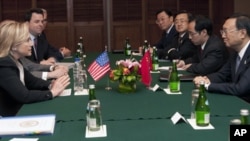U.S. Secretary of State Hillary Clinton says North Korea must act to improve relations with South Korea before six-party talks on Pyongyang’s nuclear program can resume.
Nuclear negotiators of the two Koreas met on the sidelines of the ASEAN Regional Forum in Bali Friday for the first time since negotiations broke down in 2008.
Clinton says the United States is encouraged by the north-south Korean talks on the sidelines of the meeting.
But she says the United States is “firm” in insisting there be further conciliatory steps by Pyongyang toward the Seoul government before the nuclear talks - involving the United States, Russia, China, Japan and the two Koreas - can resume.
The secretary of state spoke at a closed-door meeting of ASEAN and other foreign ministers a day after a meeting of the Korean negotiators that a senior U.S. official said was cordial and yielded some progress.
China’s official Xinhua news agency said Pyongyang proposed resuming the six-party talks without preconditions as soon as possible.
But in her ASEAN statement, Clinton said North Korea must demonstrate a “change in behavior” - ceasing provocative actions, taking steps toward irreversible de-nuclearization, and complying with U.N. resolutions and six-party commitments made in 2005.
Clinton later held a meeting on North Korea with Japanese Foreign Minister Takeaki Matsumoto and their South Korean counterpart Kim Sung-hwan.
A trilateral statement said inter-Korean dialogue should be a “sustained process” and also said there should be no resumption of six-party talks without there first being “sincere efforts” by Pyongyang to improve relations with the south.
In her ASEAN speech, Clinton said Burma, with a new nominally-civilian government, is at a “critical juncture” and that the new authorities need to break with the former military government by responding to the democratic aspirations of the Burmese people.
Assistant Secretary of State for East Asian Affairs Kurt Campbell, who has led a U.S. effort at outreach with Burma since 2009, told reporters Burma should not take its turn as ASEAN’s rotating president without democratic reform.
Campbells said, “They need to make a decision about whether they’re prepared to differentiate themselves from the previous military rulers and take the necessary steps to demonstrate that they are prepared to join the international community. And we think those steps are necessary if Burma is to play a role as the host of the ASEAN meetings in 2014. And without those steps, we feel the regime will lack the necessary international legitimacy.”
In her message, Clinton also commended ASEAN and China for their agreement Wednesday on guidelines for the peaceful resolution of territorial disputes over waters of the South China Sea.
China and ASEAN members Vietnam, Malaysia, Brunei and the Philippines, as well as Taiwan, have made overlapping claims to the strategic and potentially oil-rich ocean region, with China claiming by far the largest part.
Clinton said she is concerned that recent incidents involving naval vessels and other assets of the competing countries threaten the peace and stability on which recent Asia-Pacific economic progress is built.
She said the parties should pursue their claims in accordance with international law including the 1982 Law of the Sea Convention.
A senior U.S. official who briefed reporters said almost all the contesting countries have made “exaggerated claims” but declined to be more specific.
He said the United States would like to see the parties, as a next step, lay out their rival claims and rationales for them in detail under the Law of the Sea Treaty framework.
The official said the most important part of that treaty is that it makes clear that territorial boundaries at sea are derived from land features and are not, as he put it, “simply drawn in open ocean.”
The United States signed the treaty in 1994 but the Senate has not ratified it. The senior official said the United States abides by its terms and that lack of ratification has not impeded U.S. diplomacy on the issue.

















